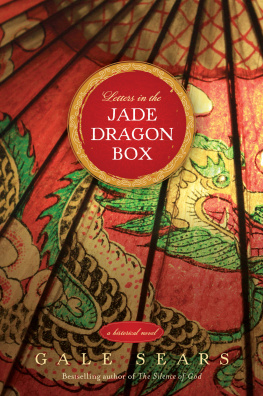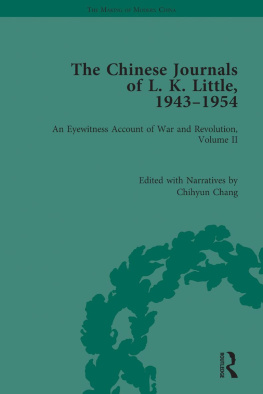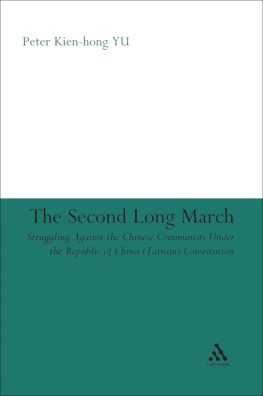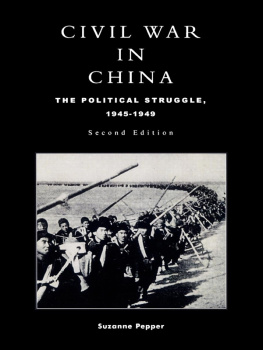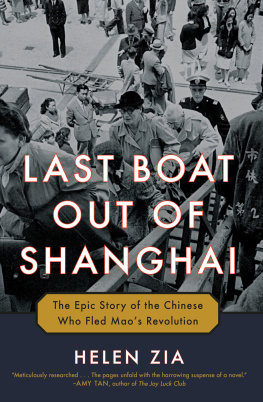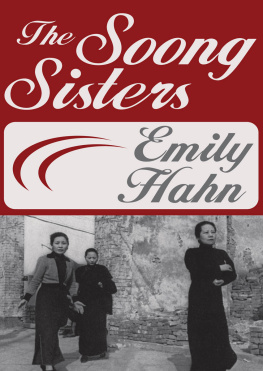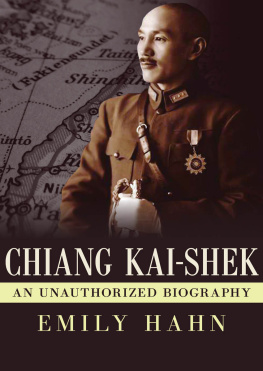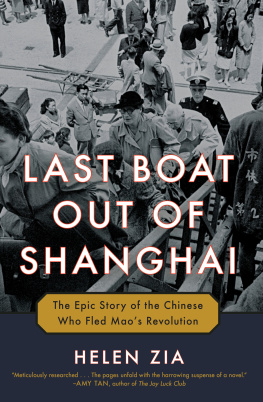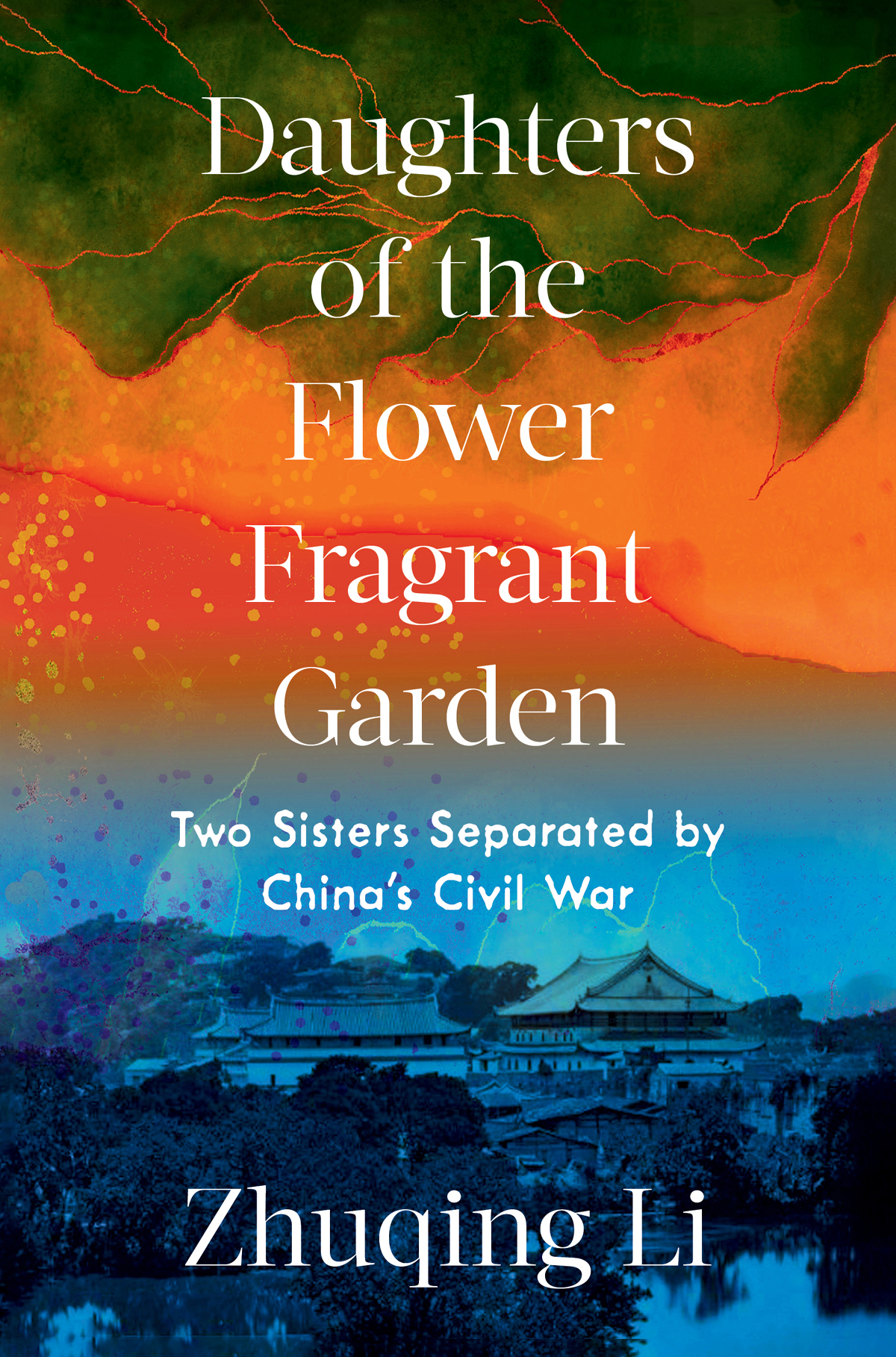Contents
Guide
Page List
Daughters of the
Flower Fragrant
Garden

Two Sisters Separated by Chinas Civil War
ZHUQING LI

To
my two aunts who have inspired me
and
Ed, Dan, and Will, who have sustained me
Beanstalks roar as the beans boil,
Weeping in the pot, the beans roil:
Out of the same roots we have grown
What is the rush to kill ones own?
Cao Zhi (192232), a poet in the Three Kingdoms period
Contents
The memories of my two aunts, told to me over many years while I collected the materials for this book, are what has made this story possible. Other members of the Chen and Shen families, and other people whom my aunts knew and recommended I speak with, have also contributed their recollections. All these memories have helped me to reconstruct the full story told in these pages. One of my aunts, however, has requested that I use a pseudonym instead of her given name. In deference to that wish, I have given her the pseudonym Hong. Except for that change, the stories told here are true to the best of my knowledge.
T O BE SEPARATED OF COURSE means having been together once, and Jun and Hong started out from the same place, a home named the Flower Fragrant Garden, a spacious, verdant family compound, one of Fuzhous biggest and richest homes. It crowned what was called the Cangqian Hill across the Min River from the main part of Fuzhou, like a tiara encircled by a low stone wall. The main building was a grand, two-story red-brick Western-style house rising from the lush greenery of the rolling grounds. A winding path dipped under the canopy of green, linking smaller buildings like beads on a necklace.
Growing up, I knew of the Garden the way one might know of a big old house in town, no more than a noteworthy part of the scenery. My parents returned from their political exile in the countryside when I was ten, and they took up posts at the Teachers College next door to the Garden. They werent senior enough to be assigned housing there, in the exclusive compound for the leaders of the university, so we lived instead in a more modest faculty apartment building not far away.

Map of Fuzhou City, 1945 . (COURTESY OF THE UNIVERSITY OF TEXAS LIBRARIES, UNIVERSITY OF TEXAS AT AUSTIN)
From there I used to go often to visit my maternal grandmothers who lived at the foot of the Cangqian Hill. Yes, I had two maternal grandmothers, a relic of the Old China, where wealthy men like my grandfather could, and often did, have more than one wife. There was Upstairs Grandma, who was Jun and Hongs biological mother; and there was Downstairs Grandma, my mothers mother. The front door of my Grandmas home had a large hibiscus tree, and through its checker-work of leaves we could see pieces of the Garden on the peak of the hill.
The Garden looked down on us like something from a fairy tale, forbidding and aloof, off limits to ordinary people. Guards were posted at its main gate. I didnt know that in times pastwhen the Chen family, my mothers side of the family, was one of the wealthiest and most prominent in Fuzhouit had owned the whole compound. Or that several branches of my extended family lived there under the same roof, where they raised many children, worshipped their ancestors, and celebrated the festivals in lavish style. During my girlhood, nobody in my family spoke of the place. But the trail that took me to school ran along the outside of the stone wall that encircled the Garden. Id walk past a ditch that overflowed in every heavy rain, skirt an abandoned graveyard that always sped me up, and at the last turn, look out on a spectacular view of the Min River below where Id pause to catch my breath.
So I knew of a hole in the otherwise impregnable wall, and one day when I was seven I went through it, pursuing a runaway ball. I lingered: the cicadas buzz was especially intense there, so was the mlange of floral and fruity fragrances.
There was nobody inside the wall, only me and my ball. What captivated me was the gigantic and massive front door of the main building, fortified with a rich layer of red lacquer and two fierce lion-face bronze knockers too high for me to reach. It stood tauntingly ajar. My heart beating, I leaned all my weight on it, and it gave way a few inches, emitting a deep, throaty, scary growl. I flinched reflexively even as I peered within. The cavernous hall inside sent out a gush of cool air seeming to threaten to suck me into the vacuum of the house. I pulled away and ran for my life, but not until I paused for a glimpse of the porcelain toilet behind a half-closed door in a small outhouse before making my way back to the hole in the wall.
Nobody spoke of my Aunt Jun either, and this was perhaps even stranger. She was my Aunt Hongs older sister. The two of them had been nearly inseparable when they were girls, especially during the eight years of war with Japan when the Chen family was forced into an internal exile. But their lives were disrupted again by Chinas Civil War, and then they were abruptly separated when the bamboo curtain fell between Communist and non-Communist regions of China. Hong never mentioned to anyone in my generation that she even had a sister, much less a sister whose own life and associations had caused both emotional anguish and political trouble for the family in Communist China. By the time I came along, Hong had become a prominent physician in Fuzhou, famous as a pioneer in bringing medical care to Chinas remote countryside, and later the grandma of IVF babies, in vitro fertilization, in Fujian Province. She was an important, unsentimental person, too busy perhaps to recount tales of days bygone. But none of my other aunts and uncles ever breathed a word either, about Jun or the Garden, to me or to my cousins. Not my own mother, not even Juns own mother, my Upstairs Grandma, ever told me or my cousins that we had an aunt named Jun.
It was only when I was finished with college in China and my application to graduate school was blocked by my new employer that Jun appeared in my life, suddenly, and out of the blue. My mother told me that I had an aunt Id never met, and that for the first time in thirty years, she was there in Fuzhou, visiting her familysomething made possible when China and the U.S. established diplomatic relations in 1979.
Maybe you should meet her, my mother said. Maybe with her foreign connections she would be able to help me go to graduate school, and in America.
And so I did meet herand she did help me. She was a slender, elegant woman, with a confident manner and an amiable smile, somehow different from the other women I knew, even while wearing the Maoist outfit that she must have picked up from some local store in order to fit in. It was she who talked to me about the Garden. Then, shocked and saddened by my complete ignorance, she started to paint me a picture of the place that she once called home. As she reminisced, I felt as if she were holding my hand and walking me through the gate, pushing open that door that Id been too scared to go through as a seven-year-old, and unlocking other doors to the past that the rest of the family had preferred to keep tightly shut. As Jun started to tell me her own and her sisters remarkable childhood and young adulthood, questions about Hong came to my mind for the first time: What was Hong doing and thinking at the time? What did she see and hear, and what was it like for her? I reached out to Hong for the other half of the story, and for the first time, learned from her far more than shed ever seemed willing to tell me before. These two remarkable and pioneering womensisters from the same family who lived their adult lives on the two sides of the bamboo curtainhad fought and won against adversities that might have crushed less powerful, determined figures. Their separation and gritty determination to succeed, which embodied the traumatic split of China itself as a nation, are what prompted me to write this book.


